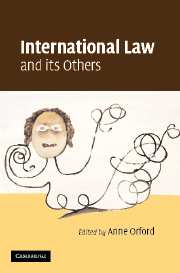Book contents
- Frontmatter
- Contents
- Acknowledgments
- Notes on the contributors
- 1 A jurisprudence of the limit
- PART I Sovereignty otherwise
- PART II Human rights and other values
- 6 Reassessing international humanitarianism: the dark sides
- 7 Trade, human rights and the economy of sacrifice
- 8 Secrets of the fetish in international law's messianism
- 9 Human rights, the self and the other: reflections on a pragmatic theory of human rights
- PART III The relation to the other
- PART IV History's other actors
- Index
9 - Human rights, the self and the other: reflections on a pragmatic theory of human rights
Published online by Cambridge University Press: 20 July 2009
- Frontmatter
- Contents
- Acknowledgments
- Notes on the contributors
- 1 A jurisprudence of the limit
- PART I Sovereignty otherwise
- PART II Human rights and other values
- 6 Reassessing international humanitarianism: the dark sides
- 7 Trade, human rights and the economy of sacrifice
- 8 Secrets of the fetish in international law's messianism
- 9 Human rights, the self and the other: reflections on a pragmatic theory of human rights
- PART III The relation to the other
- PART IV History's other actors
- Index
Summary
An introductory question: why (still) ‘do’ human rights?
This question, rare and insolent only a decade ago, has now become one of the refrains accompanying the arduous road from late- to post-modernity. For as long as criticisms of human rights seemed to be safely confined to a few die-hard neo-Marxists, securely departmentalized cultural anthropologists, and friends of the Chinese government, the (transnational) human rights activist – either ‘Western’, middle class and well endowed with the traits of cosmopolitan Kultur, or non-‘Western’ and aspiring to all of the former – could simply ignore these discordant voices. Indeed, it seemed possible, then, to spend an entire working life ‘doing’ human rights without ever stepping back to reflect on why one was actually doing them, on what ground and with what final vision of the world and the human beings in it. It seemed self-evident that human rights were both real and good, and that their absence essentially denoted intolerable human suffering. And, as this absence was the usual state of affairs, the need to ‘do’ human rights seemed never to diminish, with the challenge being so immense that it seemed capricious to engage in petty arguments on relativism or cultural imperialism. Surely, one thought, the pain felt by torture victims was the same across national and cultural boundaries, arbitrary and increasingly ephemeral as these appeared to be.
- Type
- Chapter
- Information
- International Law and its Others , pp. 221 - 244Publisher: Cambridge University PressPrint publication year: 2006



